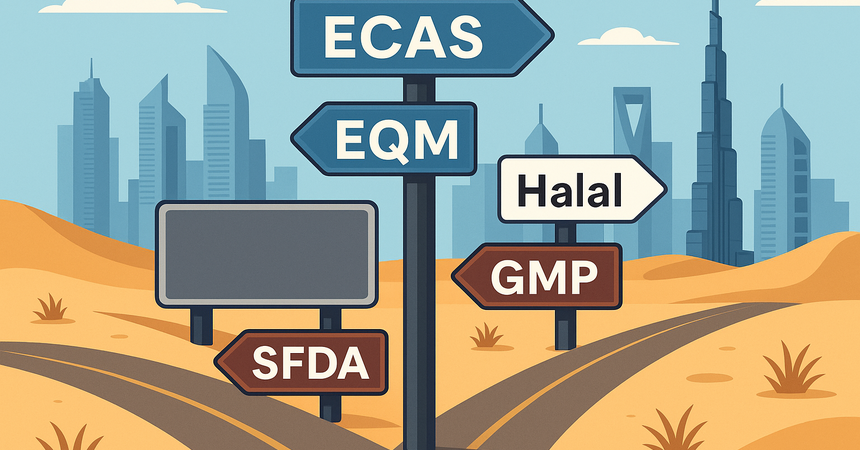Why Certification is Essential in the UAE
The UAE enforces strict product conformity rules. Without proper certification, goods will not clear customs or be allowed in retail, pharmacy, or e-commerce channels.However, UAE’s certification landscape is multi-layered, and picking the wrong path can lead to:
- Unnecessary expenses
- Customs delays
- Product rejection
Key UAE Certification Types
ECAS (Emirates Conformity Assessment Scheme)Mandatory for most non-food consumer products such as electronics, cosmetics, toys, household appliances, etc. ECAS confirms compliance with UAE national standards.
Required for most retail goods.
Must-have for customs clearance.
EQM (Emirates Quality Mark)
A higher-level quality mark involving factory audits and stricter compliance. Often required for durable goods, industrial products, and items aimed at B2B or tenders.Offers competitive advantage and smoother entry.
Sometimes mandatory in government procurement.
Emirates Halal Certification
Compulsory for food, cosmetics, medicines, or any product containing animal-derived ingredients. Only accredited Islamic bodies in the UAE may issue valid halal certificates.Required for supermarket and pharmacy entry.
Lack of halal approval can lead to automatic rejection.
GMP (Good Manufacturing Practice)
Mandatory for pharmaceuticals, dietary supplements, and some food items. Requires on-site inspection of manufacturing facilities to ensure global GMP compliance.Often required for drug and supplement registration.
Without GMP, SFDA registration is impossible.
SFDA (Saudi Food and Drug Authority)
Although it’s a Saudi Arabian requirement, UAE authorities sometimes demand SFDA clearance for medical and food products targeting the wider GCC market.Enhances product trust and market access in the Gulf.
Some product categories must be registered with SFDA beforehand.
How to Choose the Right Certification Path?
- Know your product category — food, electronics, pharma, etc.
- Check for animal ingredients — if yes, you’ll need Halal.
- Is it a supplement or medical product? — GMP is essential.
- Selling in UAE retail? — ECAS or ECAS + Halal will usually suffice.
- Bidding on tenders? — EQM may be beneficial.
How to Avoid Overspending?
- Don’t go for EQM if ECAS is enough — costs differ greatly.
- Only use accredited Halal certifiers — avoid unlicensed intermediaries.
- Get expert advice to avoid redundant tests or documents.
- Work with firms experienced in MOIAT, ESMA, EIAC, SFDA.
Conclusion
Certification in the UAE is not optional — it’s a key to market entry. With the right approach, you can save time, avoid mistakes, and position your product successfully.Let Worldwide Bridge help you choose the correct certification path, prepare documentation, complete lab tests, and obtain approval — efficiently, reliably, and turnkey. We work directly with UAE authorities to streamline the entire process.
